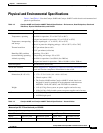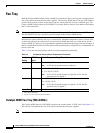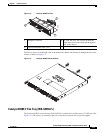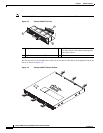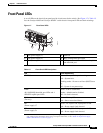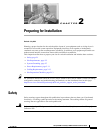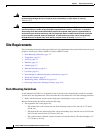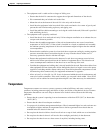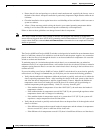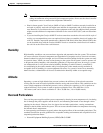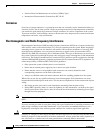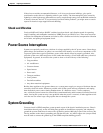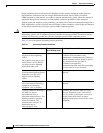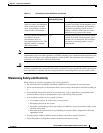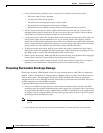
2-3
Catalyst 4948E and Catalyst 4948E-F Switch Installation Guide
OL-21561-02
Chapter 2 Preparing for Installation
Site Requirements
• The equipment rack is stable and in no danger of falling over.
–
Ensure that the shelf is constructed to support the weight and dimensions of the chassis.
–
We recommend that you bolt the rack to the floor.
–
Mount the unit at the bottom of the rack if it is the only unit in the rack.
–
Install heavier equipment in the lower half of the rack to maintain a low center of gravity and
prevent the rack from becoming top-heavy and tipping over.
–
Install the stabilizers before mounting or servicing the switch in the rack (if the rack is provided
with stabilizing devices).
• The equipment rack is properly ventilated.
–
Install the chassis in an enclosed rack only if it has adequate ventilation or an exhaust fan; use
an open rack whenever possible.
–
Ensure that the ambient temperature of the rack environment does not exceed a maximum
temperature of 104°F (40°C). If the switch is installed in a closed or multiunit rack assembly,
the ambient operating temperature of the rack environment might be higher than the ambient
room temperature.
–
Ensure that the ventilation system in a closed rack does not prevent cooling by creating negative
pressure around the chassis and redirecting the air away from the chassis intake vent. If
necessary, operate the chassis with the rack open.
–
Ensure that equipment installed near the bottom of a rack does not generate excessive heat,
which can be drawn upward and into the air intakes of equipment above. This situation can
cause overtemperature conditions in the chassis at or near the top of the rack.
–
Consider the equipment and cabling that is already installed in the rack. Ensure that cables from
other equipment will not obstruct the airflow through the chassis or impair access to the power
supplies or switching modules. Route cables away from field-replaceable components to avoid
disconnecting cables unnecessarily for equipment maintenance or upgrades.
–
Allow at least 3 to 4 feet (91.4 to 121.9 cm) of clearance behind the rack for maintenance and
removal of switch assemblies. If the rack is mobile, you can push it back within 1 foot (30.45
cm) of a wall or cabinet for normal operation and pull it out when necessary for maintenance.
Temperature
Temperature extremes can cause a system to operate at reduced efficiency and cause a variety of
problems, including premature aging and failure of chips, and failure of mechanical devices. Extreme
temperature fluctuations can cause chips to become loose in their sockets. Observe the following
guidelines:
• Ensure that the system is operating in an environment no colder than 50°F (10°C) or hotter than
104°F (40°C).
• Ensure that the chassis has adequate ventilation.
• Use proper air circulation management techniques. Chassis mounted higher in a rack enclosure are
susceptable to higher ambient air temperatures due to the heat generated from chassis that are
mounted below the chassis in the rack.
• Do not place the chassis within a closed-in wall unit or on top of cloth, which can act as insulation.
• Do not place the chassis where it will receive direct sunlight, particularly in the afternoon.
• Do not place the chassis next to a heat source of any kind, including heating vents.



